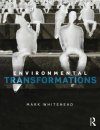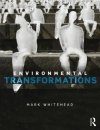By: Mark Whitehead(Author)
192 pages, 116 colour illustrations, 3 colour tables
![Environmental Transformations Environmental Transformations]()
Click to have a closer look
About this book
Contents
Customer reviews
Biography
Related titles
About this book
From the depths of the oceans to the highest reaches of the atmosphere, the human impact on the environment is significant and undeniable. These forms of global and local environmental change collectively signal the arrival of a new geological epoch: the Anthropocene. This is a geological era defined not by natural environmental fluctuations or meteorite impacts, but by collective actions of humanity. Environmental Transformations offers a concise and accessible introduction to the human practices and systems that sustain the Anthropocene. It combines accounts of the carbon cycle, global heat balances, entropy, hydrology, forest ecology, and pedology, with theories of demography, war, industrial capitalism, urban development, state theory, and behavioural psychology.
Environmental Transformations charts the particular role of geography and geographers in studying environmental change and its human drivers. It provides a review of critical theories that can help to uncover the socio-economic and political factors that influence environmental change. It also explores key issues in contemporary environmental studies, such as resource use, water scarcity, climate change, industrial pollution and deforestation. These issues are 'mapped' through a series of geographical case studies to illustrate the particular value of geographical notions, of space, place and scale, in uncovering the complex nature of environmental change in different socio-economic, political and cultural contexts. Finally, Environmental Transformations considers the different ways in which nations, communities, and individuals around the world are adapting to environmental change in the twenty first century. Particular attention is given throughout to the uneven geographical opportunities that different communities have to adapt to environmental change and to the questions of social justice this situation raises.
Environmental Transformations encourages students to engage in the scientific uncertainties that surround the study of environmental change, while also discussing both pessimistic and more optimistic views on the ability of humanity to address the environmental challenges of our current era.
Contents
Chapter 1: Introduction - Geography in the Anthropocene
Section 1: Environmental Transformations
Chapter 2: Resources - Oil and Water
Chapter 3: Air - Science and the Atmosphere
Chapter 4: Soil - The Political Ecology of Soil Degradation
Chapter 5: Forests - Jungle Capitalism and the Corporate Environment
Chapter 6: Cities - Sprawl and the Urban Planet
Section 2: Living in the Anthropocene
Chapter 7: Governing the Environment
Chapter 8: Greening the Brain: Understanding and Changing Human Behaviour
Chapter 9: Conclusions: Misanthropy, Adaptation and Safe Operating Spaces
Customer Reviews
Biography
Mark Whitehead is a professor of human geography at Aberystwyth University. His research interests include the politics of sustainable development, urban geography, and environmental citizenship. He is the author of several books including Spaces of Sustainability: Geographical Perspectives on the Sustainable Society (Routledge, 2006) and State, Science and the Skies: Governmentalities of the British Atmosphere (Wiley-Blackwell, 2009). He is the Managing Editor of the journal Environmental Values.
By: Mark Whitehead(Author)
192 pages, 116 colour illustrations, 3 colour tables




































